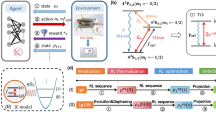Abstract
Generally, stimulated Raman adiabatic passage technology has been used to generate the Greenberger–Horne–Zeilinger state. Due to decoherence caused by long operation time, it is almost impossible to implement experimentally. To reduce the operation time, we propose a scheme to construct the shortcut to adiabatic passage based on deep reinforcement learning (DRL). Moreover, in order to facilitate the implementation, we have performed Gaussian fitting on the pulse sequence. Numerical analysis shows that our scheme has better performance than the Gradient Ascent Pulse Engineering and the Genetic Algorithm, and is robust to the leakage of the optical cavity as well as the spontaneous emission of atoms. Besides, we apply the DRL algorithm to another model and give the pulse sequence for the preparation of the three-atom singlet state with high fidelity and robustness.















Similar content being viewed by others
Explore related subjects
Discover the latest articles, news and stories from top researchers in related subjects.References
Born, M., Fock, V.: Beweis des Adiabatensatzes. Z. Phys. 51, 165–180 (1928)
Vitanov, N.V., Rangelov, A.A., Shore, B.W., Bergmann, K.: Stimulated Raman adiabatic passage in physics, chemistry, and beyond. Rev. Mod. Phys. 89, 015006 (2017)
Kang, Y.-H., Chen, Y.-H., Shi, Z.-C., Song, J., Xia, Y.: Fast preparation of W states with superconducting quantum interference devices by using dressed states. Phys. Rev. A 94, 052311 (2016)
Chen, X., et al.: Fast optimal frictionless atom cooling in harmonic traps: Shortcut to adiabaticity. Phys. Rev. Lett. 104, 063002 (2010)
Chen, Y.-H., Xia, Y., Chen, Q.-Q., Song, J.: Efficient shortcuts to adiabatic passage for fast population transfer in multiparticle systems. Phys. Rev. A 89, 033856 (2014)
Lu, M., Xia, Y., Shen, L.-T., Song, J., An, N.B.: Shortcuts to adiabatic passage for population transfer and maximum entanglement creation between two atoms in a cavity. Phys. Rev. A 89, 012326 (2014)
Chen, Y.-H., Xia, Y., Chen, Q.-Q., Song, J.: Fast and noise-resistant implementation of quantum phase gates and creation of quantum entangled states. Phys. Rev. A 91, 012325 (2015)
Liang, Y., Wu, Q.-C., Su, S.-L., Ji, X., Zhang, S.: Shortcuts to adiabatic passage for multiqubit controlled-phase gate. Phys. Rev. A 91, 032304 (2015)
Liang, Y., Ji, X., Wang, H.-F., Zhang, S.: Deterministic SWAP gate using shortcuts to adiabatic passage. Laser. Phys. Lett. 12, 115201 (2015)
Wang, Z., Xia, Y., Chen, Y.-H., Song, J.: Fast controlled preparation of two-atom maximally entangled state and N-atom W state in the direct coupled cavity systems via shortcuts to adiabatic passage. Eur. Phys. J. D 70, 162 (2016)
Chen, X., Torrontegui, E., Muga, J.G.: Lewis-Riesenfeld invariants and transitionless quantum driving. Phys. Rev. A 83, 062116 (2011)
Khaneja, N., Reiss, T., Kehlet, C., Schulte-Herbrüggen, T., Glaser, S.J.: Optimal control of coupled spin dynamics: design of NMR pulse sequences by gradient ascent algorithms. J. Magn. Reson. 172, 296–305 (2005)
Turing, A.M.: Computing machinery and intelligence. Mind 59, 433 (1950)
Silver, D., et al.: Mastering the game of Go with deep neural networks and tree search. Nature 529, 484–489 (2016)
Sutton, R.S., Barto, A.G.: Reinforcement Learning: An Introduction. MIT press, Cambridge (2018)
Bishop, C.M.: Pattern Recognition and Machine Learning. Springer, Berlin (2006)
Porotti, R., Tamascelli, D., Restelli, M., Prati, E.: Coherent transport of quantum states by deep reinforcement learning. Commun. Phys. 2, 61 (2019)
Porotti, R., Tamascelli, D., Restelli, M., Prati, E.: Reinforcement learning based control of coherent transport by adiabatic passage of spin qubits. J. Phys. Conf. Ser. 1275, 012019 (2019)
Paparelle, I., Moro, L., Prati, E.: Digitally stimulated Raman passage by deep reinforcement learning. Phys. Lett. A 384, 126266 (2020)
Yu, C.-S., Yi, X.-X., Song, H.-S., Mei, D.: Robust preparation of Greenberger–Horne–Zeilinger and W states of three distant atoms. Phys. Rev. A 75, 044301 (2007)
Shao, X., Wu, J., Yi, X., Long, G.-L.: Dissipative preparation of steady Greenberger–Horne–Zeilinger states for Rydberg atoms with quantum Zeno dynamics. Phys. Rev. A 96, 062315 (2017)
Wang, Y.-D., Chesi, S., Loss, D., Bruder, C.: One-step multiqubit Greenberger–Horne–Zeilinger state generation in a circuit QED system. Phys. Rev. B 81, 104524 (2010)
Lin, J.-Z.: Robust preparation of atomic concatenated Greenberger–Horne–Zeilinger states via shortcuts to adiabaticity. Ann. Phys. 530, 1700456 (2018)
Chen, Y.-H., Xia, Y., Song, J., Chen, Q.-Q.: Shortcuts to adiabatic passage for fast generation of Greenberger–Horne–Zeilinger states by transitionless quantum driving. Sci. Rep. 5, 15616 (2015)
Huang, B.-H., Chen, Y.-H., Wu, Q.-C., Song, J., Xia, Y.: Fast generating Greenberger–Horne–Zeilinger state via iterative interaction pictures. Laser. Phys. Lett. 13, 105202 (2016)
Cabello, A.: N-particle N-level singlet states: Some properties and applications. Phys. Rev. Lett. 89, 100402 (2002)
Yang, R.-C., et al.: Generation of singlet states with Rydberg blockade mechanism and driven by adiabatic passage. Quantum Inf. Process. 15, 731 (2016)
Brockman, G. et al.: OpenAI gym (2016). arXiv:1606.01540
Johansson, J.R., Nation, P.D., Nori, F.: QuTiP: An open-source Python framework for the dynamics of open quantum systems. Comput. Phys. Commun. 183, 1760–1772 (2012)
Johansson, J.R., Nation, P.D., Nori, F.: QuTiP 2: A Python framework for the dynamics of open quantum systems. Comput. Phys. Commun. 184, 1234–1240 (2013)
Schulman, J., Levine, S., Moritz, P., Jordan, M. I. Abbeel, P.: Trust region policy optimization (2015). arXiv:1502.05477
Hill, A. et al.: Stable baselines. https://github.com/hill-a/stable-baselines (2018)
Spillane, S.M., et al.: Ultrahigh-Q toroidal microresonators for cavity quantum electrodynamics. Phys. Rev. A 71, 013817 (2005)
van Rossum, G. Drake, F. L.: Python 3 Reference Manual CreateSpace, (2009)
Abadi, M. et al.: TensorFlow: Large-scale machine learning on heterogeneous systems. https://www.tensorflow.org (2015)
Chen, Z., Chen, Y.-H., Xia, Y., Song, J., Huang, B.-H.: Fast generation of three-atom singlet state by transitionless quantum driving. Sci. Rep. 6, 22202 (2016)
Acknowledgements
The work was supported by the Fundamental Research Funds for the Central Universities under Grant No. 2020ZDPYMS03.
Author information
Authors and Affiliations
Corresponding author
Additional information
Publisher's Note
Springer Nature remains neutral with regard to jurisdictional claims in published maps and institutional affiliations.
Rights and permissions
About this article
Cite this article
Xue, G.H., Qiu, L. Preparation of three-atom GHZ states based on deep reinforcement learning. Quantum Inf Process 20, 243 (2021). https://doi.org/10.1007/s11128-021-03172-3
Received:
Accepted:
Published:
DOI: https://doi.org/10.1007/s11128-021-03172-3




